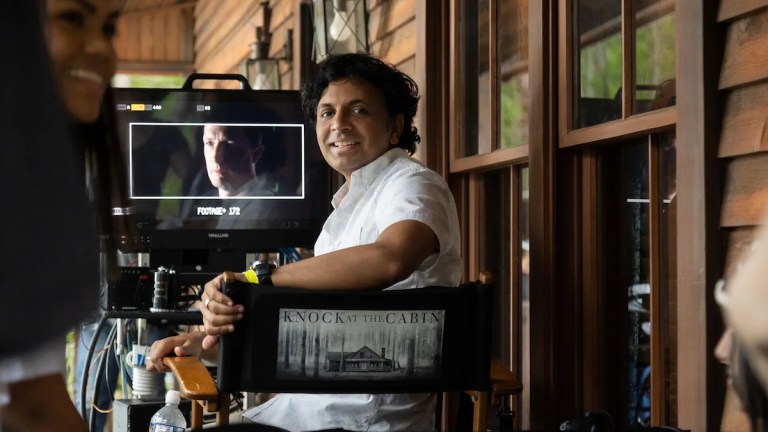M. Night Shyamalan: There’s ‘So Much More’ Than Horror to My Movies
M. Night Shyamalan chats with us about why his films, including Knock at the Cabin, don't actually play like horror movies.

It’s not what you expect to hear when M. Night Shyamalan, the director of films like The Visit and Split, leans over to tell you, “I never think my movies are horror.” He says that even as it’s the genre he’s been tied to ever since a little boy confessed he sees dead people. “That’s where they are in the supermarket, they’re on the horror shelf,” the director admits, “but there’s so much more.”
It’s both understandable that Shyamalan’s name is associated with horror and also that he doesn’t exactly see it the same way. The first watch of The Sixth Sense, or even Signs and The Village, is marked in the memory by jump scares and genuinely terrifying scenes and sequences, but once the twists (another thing that Shyamalan is known for) are revealed, his films usually offer something different on second and third viewings. Shyamalan’s new film Knock at the Cabin is no different.
Based on the novel The Cabin at the End of the World by Paul Tremblay, the film starts with a family vacationing in a remote cabin when four strangers turn up and ask the family to be let into the cabin. It becomes increasingly clear that if they are not let in, they will force their way inside. They promise they have no intention of hurting any of them, but the weapons they carry and their desperation make it a promise that’s hard to trust. Eventually, the group of strangers insist they are on a defined mission and that this family has a choice to make; they must choose one of their own to be sacrificed to save the rest of humanity.
“The primary thing for me was this cacophony of whether they’re telling the truth or not,” Shyamalan explains. “You’re swinging with the doubt, which is so delicious for me.” There is a lot to be doubtful of in the film. If you’ve seen the trailer, it would be easy to assume this is a run of the mill cabin in the woods horror movie, but it wouldn’t be a Shyamalan film if there wasn’t a bit more to it than that.
As Shyamalan notes, his signature style has come to be about audiences not trusting him. “In a great way!” he adds. And having a popular novel as the source material hasn’t stopped Shyamalan from keeping the audience on their toes.
“[I] don’t want them to know anything,” Shyamalan says. “The fact that it’s so different from the book is a wonderful thing.” In the case of Knock at the Cabin, there was an early draft of the script that was a faithful adaptation to the book floating around town, and Shyamalan was thinking about producing that at one point. But even then, he was happy to suggest changes he thought should be made. After several months, that first script never got enough momentum to be fully greenlit, which is when Shyamalan got a call from the rights owners of the book.
Says Shyamalan, “[They] said, ‘We heard where you thought the movie should go, and that’s where we think it should go too.’ And I said, ‘Oh wow let me think about this.’ I was so connected to the premise.”
There are of course always changes made when a book is being turned into a script, some things simply do not translate from page to screen. There are many differences from The Cabin at the End of the World and Knock at the Cabin, which cumulatively make the book and the film feel almost like entirely different entities.
“There’s a moment in the book where it goes severely left, and I’m like, that just can’t happen,” he says of the biggest change to a very shocking and violent scene. The changes do mean that whether audiences read the book before the film, or vice versa , there will be surprises either way, or as Shyamalan puts it: “It’s an interesting thing to almost see two artists take the same premise and do two different things with it.”
So if Knock at the Cabin is not straight horror, what is it?
“The characters have to make a decision, an extraordinary decision without absolutely knowing,” Shyamalan says of the game the central family is being forced to play. “It’s a jury movie, to some extent. You’re giving a verdict of some kind. It’s the ticking clock that decides it.” Because of the obvious and profound love between the couple and their daughter, the choice is that much harder to reason with and their suffering that much harder to stomach. As Shyamalan insists, “The most salient thing about the movie ultimately [is] the love story.”
This is a recurring theme with Shyamalan, the relationships between the characters are always the heart of the story. In The Sixth Sense, it’s Dr. Crowe (Bruce Willis), who is longing for his wife, and Lynn (Toni Collette) trying to connect with her son Cole (Haley Joel Osment). In Signs, it’s Rev. Hess (Mel Gibson) trying to find meaning in the loss of his wife and to do his best to support his grieving family. In Knock at the Cabin, it’s Andrew (Ben Aldridge) and Eric (Jonathan Groff) trying desperately to protect each other, their adopted daughter Wen (Kristen Cui), and the life they have managed to build together, against the odds.
Intriguingly, Shyamalan reveals that he’s asked his own family about the choice that’s presented to the characters in the film. And he admits, “Wherever you are in your thought pattern about your family members versus humanity, it vacillates. There were times it was absolutely no, and then eventually there was a moment where it was absolutely yes.”
With Andrew, Eric, and Wen, there is the sense that they are standing firm altogether or not all, but doubt has a funny way of creeping in, especially when Leonard (Dave Bautista), a mountain of a man and the leader of the group of strangers, is seemingly so gentle and so reasonable.
“It just seemed impossible, what was written,” Shyamalan says in regards to casting Leonard. “[He] has to be a giant, who’s fragile and is the complicated center of the piece. Honestly, I think there’s only one person on the planet that could have played the part, and lucky for me, he said yes.” Bautista is undoubtedly an excellent bit of casting, and he makes an easy job of playing a man who seems intimidating but exudes patience and kindness. Says Shyalmalan, “That’s who [Bautista] is. Such a gentle soul.”
Horror definitely exists in Knock at the Cabin. The choices and consequences that come with the story are horrific; the increasingly tense situation is horrific; and the fact that there is a child witnessing it all is horrific. But the film is always firmly grounded in very human feelings and relationships. Everyone is trying to do the right thing, but it is unclear what the right thing is and time isn’t on their side. In that way, Knock at the Cabin fits the criteria of what Shyamalan hopes to achieve in all his films, whether they’re viewed as horror or not.
“I want them to be super suspenseful and thriller-y,” he says. “That’s definitely the contract between me and the audience. But as well as, you know, the emotional parts.”
Knock at the Cabin is in theaters now.
